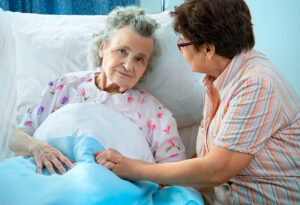Understanding Bruising in Seniors: Prevention and Warning Signs

Elder care can help create a safer environment for aging seniors.
Of the many changes the body undergoes with age, a higher risk for bruising might not be one that seniors or their loved ones are prepared for, especially when both parties realize that bruises can occasionally point to more serious health issues. The good news is that with the help of the medical team and elder care, seniors and loved ones can better understand bruising and know when more assistance is needed.
What Leads to Senior Bruising?
Seniors may bruise for a number of reasons, such as:
- Thin Skin: As they age, their skin becomes less elastic and thinner, which increases their vulnerability to bruises from even small injuries.
- Decreased Subcutaneous Fat: With age, the amount of subcutaneous fat beneath the skin lessens, which means the skin isn’t cushioned as much as it once was.
- Fragile Blood Vessels: The blood vessels become more brittle with age, which increases the risk of bleeding and bruising.
- Medications: Some medications (including blood thinners) and supplements (including aspirin) might raise the risk of bruises by interfering with blood coagulation. Elder care can encourage seniors to talk with their medical team about the medicines they take to see if there are alternatives that might lessen bruising.
- Medical Conditions: Vitamin deficiencies, particularly those of C and K, liver illness, and coagulation abnormalities are examples of underlying medical conditions that might increase bruising.
What Can Seniors Do to Prevent Bruising?
Even though it might not be feasible to totally prevent bruises, seniors can reduce their risk by doing the following:
- Wear Protective Clothing: Long-sleeved shirts, slacks, and supportive shoes can add an extra layer of defense against cuts and bruises.
- Fall Prevention: As falls frequently result in bruises, preventing falls by putting in handrails and avoiding potential tripping hazards can help reduce the risk of bruises.
- Eat an Appropriate Diet: Consuming a well-balanced diet high in vitamins C and K can help to maintain healthy skin and enhance blood coagulation.
- Exercise: Maintaining muscle strength and balance with regular exercise lowers the chance of falls and the bruises that may follow. However, seniors will need to be careful during exercise to make sure the movements don’t cause bruising.
When Should Seniors and Loved Ones Be Concerned About Bruising?
Even while bruises are usually benign, they can occasionally be a sign of a more serious underlying medical condition, particularly if:
- Bruises happen often and have no apparent reason. If bruises develop on their own or with little impact, they can be a sign of a blood disorder or another ailment that needs to be checked out.
- Seniors often have large or extremely painful bruises, which may require medical treatment because they may be signs of a more serious injury or underlying health issue.
- Bruising comes with additional symptoms. If seniors have additional symptoms, including weakness, exhaustion, or unexplained weight loss, it could indicate a serious health problem that needs to be looked at.
Seniors may see an increase in bruising as they age, most often due to aging-related skin and blood vessel changes. Even though the majority of bruises are benign and go away on their own, seniors, elder care, and loved ones should pay attention to bruising to ensure it doesn’t point to a bigger issue.
If you or someone you know needs Elder Care in Spanish Fort, AL, please contact the friendly caregivers at Hughes Home Care. We provide quality and affordable care for your elderly loved ones in our community. Serving Mobile & Baldwin County. Call us today at (251) 517-9901
Sources:
- https://www.havenhealthaz.com/blog/what-causes-unexplained-bruises-in-seniors/
- https://www.afcurgentcare.com/stoneham/blog/when-does-a-bruise-need-medical-attention/
- https://chgseniorliving.com/understanding-elderly-bruising-and-risk-prevention/
- Understanding the Importance of Moisturizing Senior Skin - July 23, 2024
- The Two Biggest Changes to Make to Reduce the Risk of Coronary Heart Disease - July 9, 2024
- Helping Seniors Stay Safe While Gardening - June 27, 2024
